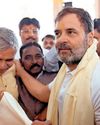
A LOT HAS CHANGED in a few months, and it was clearly evident in the Modi 3.0 government's first budget.
Union Finance Minister Nirmala Sitharaman presented an interim budget on February 1 against the backdrop of the confidence that the BJP-led government would return to power with a larger majority, and her speech dwelled on the achievements of the BJP's decade-long rule.
On July 23, Sitharaman''s speech presenting the full budget was just 30 minutes longer than the previous one, and conveyed a succinct message reflecting the new political landscape.
With an apparent hint of course correction, the focus shifted to job creation, putting more money in the pockets of the middle class, and giving the rural economy a boost, signalling that the government was sensitive to their distress. According to a survey by the Centre for Monitoring Indian Economy, unemployment rate in India rose sharply to 9.2 per cent in June 2024 from 7 per cent in May. The budget's job pitch may provide relief to the youth and the middle class.
The political intent of the budget outweighed the big-ticket reforms the government had promised before the 2024 polls. But what marks the continuity from the interim budget is the promised fiscal consolidation— with the targeted fiscal deficit going down to 4.9 per cent of the GDP from the 5.1 per cent set in February—and the infrastructure push. Also, the finance minister did not quote any poet, just like the interim budget, and kept her speech short.
هذه القصة مأخوذة من طبعة August 04, 2024 من THE WEEK India.
ابدأ النسخة التجريبية المجانية من Magzter GOLD لمدة 7 أيام للوصول إلى آلاف القصص المتميزة المنسقة وأكثر من 9,000 مجلة وصحيفة.
بالفعل مشترك ? تسجيل الدخول
هذه القصة مأخوذة من طبعة August 04, 2024 من THE WEEK India.
ابدأ النسخة التجريبية المجانية من Magzter GOLD لمدة 7 أيام للوصول إلى آلاف القصص المتميزة المنسقة وأكثر من 9,000 مجلة وصحيفة.
بالفعل مشترك? تسجيل الدخول

Use multi-asset investing to overcome portfolio volatility
EQUITY MARKETS have been choppy during this year. After rallying for the better part of the first nine months of 2024, equities corrected sharply in October and November, before taking off once again on rally mode in December.

Twist of faith
Upamanyu Chatterjee is back with his wry sense of humour in his new novel, and most of it is directed at religion and spirituality

THE GLORY OF SARI
Saris of Memory weaves together history and textiles, highlighting key moments from the author's collection

We win together
We invented chess, which was pretty cool of us. The original game 'chaturanga'that is four divisions (infantry, cavalry, elephantry and chariotry)-was a war strategy game. When the game travelled to the Middle East, they mangled the Sanskrit and it ended up being called 'shatranj' instead.

BEATS THAT HEAL
Music ignites the light within us, says Grammy-winner Chandrika Tandon

Older, smarter, sexier
Those who worship him regardless of where he works have continued to do so. Such is the power of Alessandro Michele, that after being the face of some mega brands for 10 years (namely Gucci and now Valentino), he remains bigger than the labels themselves. His debut collection for Valentino was presented at the recent Paris Haute Couture Week, and it has been adored by his adorers.

The road to peace
Future political dialogues should explore means of ensuring a more robust autonomy to tribal communities

Diary of a Sherpa
Amitabh Kant's new book is a comprehensive account of the G20 Summit held in Delhi in 2023

The annoying orange
Everything is great. All is sunshine. I am an eternal optimist.\" It's the fad of our TikTok times everything is not great, the sun sets daily, nothing is eternal. If anything, everything is ephemeral, night brings darkness, and optimism often crumbles under the weight of history. British philosopher Roger Scruton warned: \"Hope untempered by the evidence of history is a dangerous asset, one that threatens not only those who embrace it, but all those within range of their illusions.\"

NO SEAT, YET UPBEAT
The Congress is buoyed by its increased vote share in Delhi, and feels it can push the AAP into further decline